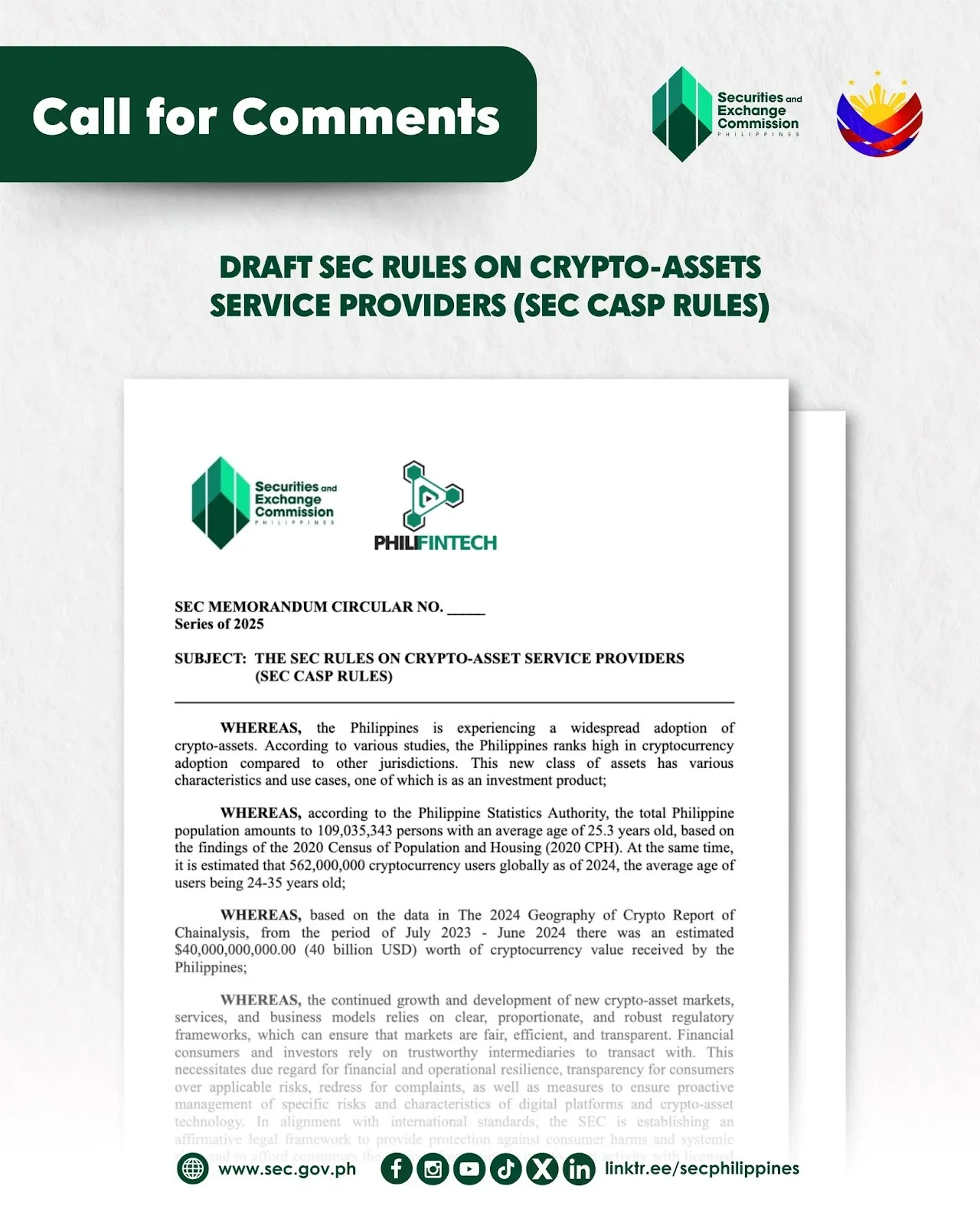The Philippine Securities and Exchange Commission (SEC) has taken a major step toward regulating the country’s fast-growing digital asset industry by issuing draft guidelines for Crypto-Assets Service Providers (CASPs).
The proposed rules, titled “The SEC Guidelines on the Operations of Crypto-Assets Service Providers (CASP Guidelines),” outline strict conditions for businesses offering crypto-assets in the course of trade within the Philippines. Most notably, the guidelines introduce a mandatory minimum paid-up capital of PHP100 million ($1.75 million) for entities seeking registration as a CASP. At the same time, the draft allows for potential exemptions from registration, depending on an entity’s circumstances and the public interest.
The SEC released the draft through its PhiliFintech Innovation Office and invites comments from interested parties until April 26. The agency clarified that any business operating in the Philippines that offers digital assets as part of its services must comply with these forthcoming CASP regulations. This public consultation period marks a crucial phase before the guidelines are finalized and formally adopted.

Source: Securities and Exchange Commission Philippines/Facebook
Capital requirement to ensure market stability
The SEC appears intent on admitting only financially sound companies into the digital asset ecosystem to promote market stability and safeguard investor interests. Furthermore, the draft emphasizes that capital requirements go beyond just meeting the PHP100 million ($1.75 million) mark. Applicants must prove that their business has the financial capacity to continue operations, meet all debt obligations as they arise, and maintain enough resources to cover any foreseeable or contingent liabilities. This indicates that financial resilience and long-term viability will be part of the SEC’s evaluation process.
Comprehensive documentary requirements for registration
To qualify as a CASP, an entity must be a duly registered corporation with the SEC and have its primary purpose, stated in its Articles of Incorporation, explicitly related to digital asset services. The application process also involves submitting various documents under CASP Form 1. These include listing and delisting standards for digital assets, trading and disclosure rules, business conduct policies, authorization for the SEC to verify bank accounts, and detailed technical descriptions of software, hardware, and communications infrastructure.
Other requirements include information about the custodian or registrar of the digital assets, a Board Resolution authorizing the application, CVs of key management and IT staff, copies of relevant licenses and agreements, a comprehensive risk disclosure matrix, and documentation related to the company’s independent risk control unit.
Additionally, applicants must submit a business plan detailing marketing and financial strategies, proof of filing fee payment, trade clearing and settlement procedures, and an undertaking from senior management to actively oversee risk management.
SEC may grant exemptions based on public interest
While the draft establishes strict registration guidelines, it leaves room for exemptions. Section 3 of the draft states, “The Commission, by an order, after an application for exemption from CASP registration has been filed, may grant such exemption after determining that said order is consistent with the public interest and the protection of investors.” This discretionary power allows the SEC to exempt certain applicants from full compliance if they can justify it under public interest considerations.
However, exemptions will not be automatic and must be formally applied for. The draft does not currently outline specific types of entities that may qualify for such leniency, suggesting that decisions will be made on a case-by-case basis.
Coordination with other regulators maintained
The proposed CASP Guidelines also clarify that they do not override the authority of other regulators, such as the Bangko Sentral ng Pilipinas (BSP), which supervises certain aspects of digital asset-related activities. This indicates a multi-layered regulatory structure in the Philippines, requiring digital asset businesses to navigate overlapping compliance regimes depending on the nature of their operations.
Industry impact: Consolidation and compliance
The Philippine SEC’s move to regulate the digital asset industry aligns with global efforts to introduce safeguards, protect consumers, and reinforce market integrity. The high capital threshold will likely filter out undercapitalized firms and lead to greater consolidation within the industry, possibly favoring more established players.
However, the flexibility offered through exemptions may benefit innovative or smaller firms that can demonstrate responsible operations in line with public interest and investor protection. This dual approach, rigid on baseline requirements but open to well-justified exceptions, could help create a more stable yet dynamic digital asset environment in the Philippines.
Next steps: Review and finalization of guidelines
After the consultation period, the Commission is expected to review comments and finalize the guidelines. According to the draft’s effectivity clause, the circular will take effect 30 days after publication in two newspapers of general circulation. Introducing these rules could significantly shape the future of digital regulation in the Philippines, impacting how service providers operate and how investors engage with digital assets.
Watch: The Philippines is moving toward blockchain-enabled tech
title=”YouTube video player” frameborder=”0″ allow=”accelerometer; autoplay; clipboard-write; encrypted-media; gyroscope; picture-in-picture; web-share” referrerpolicy=”strict-origin-when-cross-origin” allowfullscreen=””>



